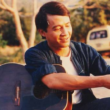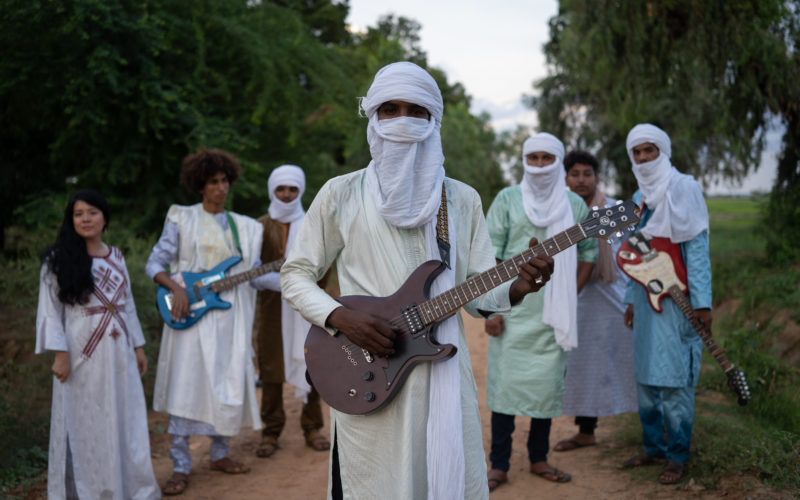Compared to its neighbouring countries Nigeria and Mali, Niger’s popular music has had little by way of international attention. However, there’s a growing international interest in the music of Niger and in 2019 the legendary musician Bombino became the first Nigerien artist to be nominated for Best World Music Album at the GRAMMY Awards. From the rural villages to the bustling capital of Niamey, here’s a few picks to get you started.
Toumastine
Hailing from different regions and tribes spanning from Toumbouktou, Mali, to Agadez, Niger, this young band formed in Niamey. They are united by a love of their Toureg cultural heritage and dream to see their land free of conflict. Toumastine translates to “My identity” in Tamajek. In the beginning, the band lacked the means to even buy instruments, so they innovated by using car clutch cables as guitar strings for instance. Next, the absence of available recording studios also proved no barrier for the determined group and so they built their own from scratch and relied on Youtube tutorials to learn how to use the recording equipment. Their new album Assouf is the remarkable fruit of their labour. Inspired by the likes of Bombino, Bob Marley and Tinariwen, it was released last month and is a real treasure. Their lead single Hegh Tenerenin is a desert blues reggae crossover with groovy 60s rock organ chords and the lyrics are an impassioned call for unity. Meanwhile, Tarha Tasidwalt (Love is a harvest) is a mesmerising duet between the male and female vocalists and the melancholy guitar solos go directly for the heart strings.
Les Filles de Illighadad
Illighadad is a rural village in central Niger and it’s here we find the first female Tuareg professional guitarists, Fatimata Ahmadelher and Fatou Seidi Ghali. They’re joined by Fatou’s brother, Abdoulaye Madassane, providing rhythm guitar, her cousin, the renowned vocalist Alamnou Akrouni, and Ahmoudou Madassane on vocals and guitar. Their music draws on local traditional chants and the timeless sound of Saharan desert guitar music. Imigradan opens with an a cappella repeated phrase and it gives way to a soft instrumental. The textured and repetitive guitar riffs and steady percussion beat has a hypnotising effect, like watching a flowing river.
Mamaki Boys
Something a little different now, Mamaki Boys are a Nigerien underground Hip Hop duo. Inspired by DIY hip hop, electronic dancehall and ancestral village music, they describe themselves as “tradi-moderne”, infusing new energy into traditional folk. During the original recording process, the duo invited elder musicians into Niamey’s Studio BAT to play traditional instruments such as the duma and kalango. The recordings were then chopped up, sampled and looped, and each track is based on Nigerien dances. The lyrics are an urgent call to action on globalisation and protecting cultural identity. For instance, Kagani Kagani demands colonisers to give back mineral, oil, and uranium rights while Komando is a war cry encouraging artists to keep standing up and speaking out. Their album Patriote was originally released on CD in 2007 in Niger. However, this year the album has been given a fresh lease of life, and it’s been remastered and reissued by Sahel Sounds.
Mdou Moctar
Mahamadou “Mdou Moctar” Souleymane is a guitarist from Agadez, a desert village in rural Niger. For his 2017 folk album, Sousoume Tamachek, he played every instrument on the record, but for his more recent music and touring, he has the help of a band. He’s joined by Ahmoudou Madassane (rhythm guitar and backing vocals), Michael “Mikey” Coltun (bass guitar, backing vocals, producer), Souleymane Ibrahim (drums, percussion, backing vocals). More on the rock end of Toureg blues, Chismiten, from their latest album Afrique Victime, is an explosion of electric guitar shredding that swirls into a feverish climax.
Studio Shap Shap
Studio Shap Shap was founded in 2015 in Niamey and are a group of six. Two of the members, bass player Arobasse and mola and komsa player Ousselni, were previously members of the Jazz-Pop band Mamar Kassey (also well worth a listen). Their blues tradi-electro songs feature the distinctive sounds of the Sahelian instruments, including the Douma (goat skin percussion), the kalangou (drum), the Komsa (camel skin string instrument) and the Kindé (traditional harp). Blended with funky electronic beats and samples of speech and the natural and urban world (L’hivernage has rooster crowing and traffic for example), their music weaves an intricate multilayered tapestry of sun drenched music. The band have been touring festivals for the past few years and have recently been teasing the release of new music.








